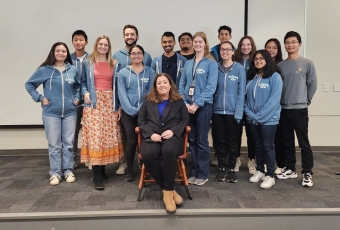
The UC Santa Barbara Chemical Engineering Department recently honored Professor Michelle O’Malley for her pioneering research and appointment to the Cliff R. Scholle Endowed Chair with an inaugural lecture and investiture. The chair was established through a generous gift from Cliff R. Scholle, as a way to honor early leaders in the department: Professors Duncan A. Mellichamp, John E. Myers, Robert G. Rinker, and Orville C. Sandall, who had a profound influence on him and generations of students. Scholle received a bachelor’s degree in chemical engineering from UCSB with a minor in geology in 1970, before pursuing a successful career as a scientist specializing in air quality research.
"It is an honor to be the inaugural recipient of the Scholle Chair in Chemical Engineering,” said O’Malley. “I've built my career here at UCSB, and it's been a thrill to help push the disciplinary boundaries of chemical engineering research. This recognition will help to fuel more bold ideas from my group at the interface of microbiology and engineering to solve grand challenges in the environment and human health."
The ceremony included remarks from UCSB Chancellor Henry T. Yang, Umesh Mishra, dean of the College of Engineering, and Michael Gordon, chair of the Chemical Engineering Department. Professor Emeritus Duncan Mellichamp, and students, faculty, and staff from the College of Engineering. O’Malley’s family also attended.
“An endowed chair is a high honor that a university bestows on a member of the faculty in recognition of their exceptional accomplishments as a researcher and mentor, and to empower them on their continued journey of discovery and social impact,” said Mishra. “We celebrate Professor O’Malley for her pioneering work of using anaerobic microbes to transform biotechnology, and we congratulate her on the well-deserved honor.”
The O’Malley research group focuses on the biotechnological potential of microbes that perform unusual chemistry — such as those that remediate waste in compost piles, soil, and even herbivore guts. Her group engineers anaerobes and microbial consortia for sustainable chemical production, bioremediation, and natural product discovery. The group pioneered new techniques to isolate anaerobes from biomass-rich environments, characterize their shared metabolism, and engineer synthetic microbiomes to drive biomass to for renewable chemicals and materials.
Her pioneering work has resulted in numerous prestigious awards, including the Presidential Early Career Award for Scientists and Engineers (PECASE), the Department of Energy’s Early Career Award, and the American Institute of Chemical Engineers’ Allan P. Colburn Award for Excellence in Publications by a Young Member of the Institute. An elected fellow of the American Institute for Medical and Biological Engineering, O’Malley also serves as director of the new National Science Foundation BioFoundry for Extreme and Exceptional Bacteria, Archaea, and Fungi (ExFAB), a first-of-its kind center created through a six-year, $22-million grant to enable the discovery and engineering of extreme microbes to enable the next generation of synthetic biology.



